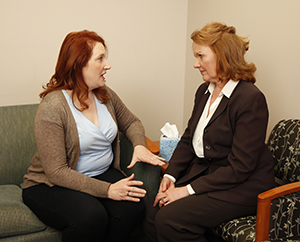Obsessive-compulsive disorder (OCD) means having constant, intrusive fears (obsessions) that cause you extreme anxiety. Examples include repeated, relentless thoughts about germs. Or you may have a constant worry that you left the door unlocked. Certain behaviors (compulsions) help relieve the anxiety. You might wash your hands over and over, or repeatedly check the lock. These compulsions can take hours out of your day and cause major problems in your life. In most cases, treatment can help relieve your symptoms. Talk with your healthcare provider or a mental health professional. They can help you.
How does it feel?
You probably know your thoughts and actions are irrational, but you can’t stop them. Common obsessions are:
-
A fear of germs or contamination. This can lead you to wash your hands over and over, wear gloves, or clean the house constantly.
-
A fear that you didn’t do something important, such as turn off the stove or lock the door. You check these things repeatedly.
-
A need to do tasks in a certain order or to have items counted out, arranged, or organized in a certain way. If the routine is even slightly altered, you feel great anxiety and the need to start over.
-
A fear of throwing away something you might need later. This fear may lead to hoarding.
Who does OCD affect?
Most often, OCD strikes teens and young adults. But even preschool children may have the disorder. Both men and women are affected. It also affects people of every race and income level.
What causes it?
Experts once thought OCD was caused by beliefs you learned in childhood. But it’s now known that brain chemistry plays a large role in the disorder. OCD also seems to run in families. Bacterial infections, such as rheumatic fever, may trigger OCD in some people.
Getting help
You may try to hide symptoms of OCD from others. You also may be afraid to seek help. Having OCD is nothing to be ashamed of. Treatment with therapy and certain medicines can help ease your distress.
Obsessions and compulsions
An obsession is a constant, unwanted thought that you can’t control. You may know the thought is unreasonable. Yet you can’t seem to stop it. For instance, you might be very clean. Yet you may constantly worry about germs. Obsessions can make you anxious and unhappy.
A compulsion is an urge to do something to lessen distress. In OCD, you’ll likely feel the need to repeat certain actions. This may help reduce the concern caused by obsessive thoughts. The most common compulsions are washing, cleaning, and checking. For instance, you might spend hours each day washing your hands. Or you might check your stove over and over to make sure it’s turned off. In severe cases, compulsions can take over your life. Common compulsions include:
-
Cleaning. You may spend hours each day washing yourself or cleaning.
-
Checking. You fear you may harm yourself or others. So you check what you’ve done again and again.
-
Repeating. You repeat a word or name over and over.
-
Avoiding. You go to extremes to avoid what scares you.
-
Hoarding. You may save a large number of items that you don’t need.


